The content marketing software industry is set to grow 18.7% every year.
As content marketing gains more significance worldwide, it only makes sense that marketers would want to organize and plan their efforts better. And to do that, they need an effective content marketing platform.
You may be a solo content creator, a small startup, or an established enterprise. Regardless of the size of your business and the scale of your content marketing campaigns, the right software can revolutionize your creative process.
So in this guide, I’ll walk you through all you need to know about choosing the best content marketing software for your business.
What is content marketing platform software?
As you know, content marketing involves developing useful and relevant stories that attract, capture, nurture, and convert your target audience.
But developing such content on a consistent basis is challenging. Plus, buyers’ expectations of your content are only increasing. They want more content, they want it fast, and the content has to be better than the competition.
A content marketing platform (CMP) is a tool that helps with all three aspects. It brings all your content marketing activities in one place, and it helps you streamline content creation and distribution across multiple marketing channels.
With a content marketing platform, you can organize your content strategy, content development, project management, team approvals, and performance measurement. It takes care of several important tasks, such as:
- Generating and improving content creation ideas
- Creating and managing your content schedule for different platforms
- Facilitating team collaboration
- Streamlining the writing and editing process
- Optimizing content with best SEO practices
- Viewing content performance metrics to refine future strategy
In other words, content marketing software lets content creators orchestrate content development and promotion projects from start to finish. And it helps keep each content asset consistent in terms of voice and quality, further solidifying your brand.
Why use content marketing platform software?
Content marketing platforms provide several advantages that add to the effectiveness of your campaigns. Here are the key benefits:
Better content
Content marketing platforms come with modern features to draft, edit, and optimize content.
For example, advanced content marketing software these days includes built-in content analytics, on-page SEO capabilities, and style recommendations.
These features increase your chances of developing high-quality content that will engage customers and rank high in search engine result pages.
Improved content promotion
Content marketing platforms have several integrations to help you publish and distribute your content on multiple channels for broad exposure. These include your blog, social media networks, email newsletters, and video-sharing websites.
Besides that, there are automation workflows that let you publish content pieces automatically at optimal times, leading to maximum audience engagement.
Streamlined process
As discussed before, content marketing software gives you a unified portal where your team members can discuss ideas, plan content assets, and get the right approvals.
This portal has features like a content calendar, task manager, team comments, and more. These improve collaboration and optimize the creative process.
Cost and time efficiency
Since a content marketing platform brings everything in one place, you won’t be spending a ton of money on 10 different tools. Nor will you waste time switching among these tools to keep track of and manage your content projects.
Combine these benefits with the automation features that let you eliminate many of the manual team tasks, and you’ll see a remarkable increase in productivity.
Data-driven suggestions
Another benefit of content marketing software is the robust content analytics and performance reporting. So you can monitor audience engagement and modify strategies for the best results.
For example, you can examine metrics like social media shares, page views, and conversions to measure the success of your content. This information allows you to identify what’s working and what to change to meet the needs of your potential customers.
What to look for in a content marketing platform?
Now that you know the benefits of content marketing software, you may be ready to get one. But there are many options in the market. And choosing the right content marketing platform is essential. Here are the factors to consider when evaluating different content marketing platforms.
Customizability and scalability
The more content you produce, the more complex will be its ongoing management. Your content marketing platform should be able to scale with the growth of your business and content marketing operation.
When looking at different content marketing software, check for flexibility and adaptability in light of your future needs. Seamless customization and integration with other applications you use is a must for an efficient workflow.
Feature set
Does the content marketing software cater to the specific needs of your team members? It should have functionalities that facilitate content creation, SEO, sharing, and social media integration. Make sure that your platform comes with a comprehensive suite of capabilities that match your content marketing objectives.
Simple interface and ease of use
The learning curve is an important consideration for a content marketing platform. Is it intuitive and easy to use? Or does the interface look complicated and cluttered? Can your team members easily find what they’re looking for?
Customer service and knowledge base
There will often be times when you or your team members need help or training to use the content marketing software. In those times, you’ll be glad that you picked a platform that has thorough and up-to-date documentation and help guides.
Plus, you also need quick and easy access to reliable customer support professionals should you run into any problems that can’t be resolved on your own.
Budget and cost
Finally, consider your budget and see which platforms have pricing plans that align with how much you can spend. This is a good time to prioritize which features you want the most and which you can leave out if needed.
Also, check how the pricing will change if your needs change in the future and you need to upgrade to a higher plan.
Best content marketing platforms
For the following list, I have chosen content marketing platform companies that stand out from others because of their remarkable capabilities. They come with a wide range of features to help brands improve their content marketing strategies.
StoryChief
StoryChief has a reputation as an industry-leading content marketing platform, thanks to its remarkable functionalities. It has capabilities that help brands optimize content development and promotion.
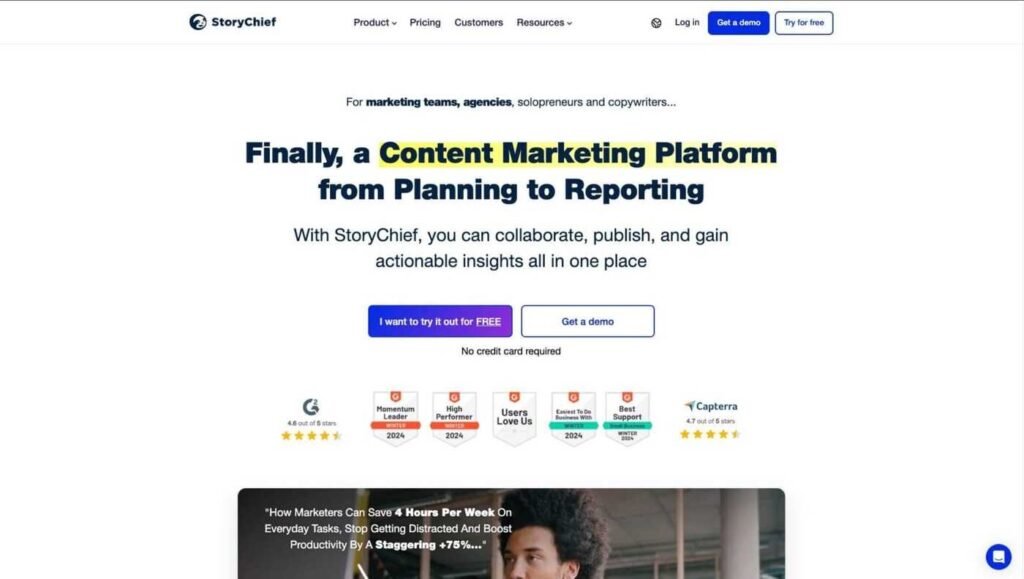
The software provides an intuitive interface and smooth workflow. These benefits make it a sought-after tool among content marketers. Key features include:
Team collaboration: Storychief’s collaborative interface lets team members work in sync when executing content development, editing, and review tasks.
Multi-channel publishing: This feature lets you publish content across multiple channels, including blogs, social media, and email newsletters.
Analytics reporting: StoryChief’s robust performance tracking tools give you useful insights into your campaigns’ success. Metrics you can track include conversions, views, and engagement.
You can be part of a startup or a big business. But regardless of the size of your business, StoryChief’s features can help improve your content marketing operations and deliver positive results.
Contently
Contently is a strong contender among content marketing platforms. It’s well-known for its comprehensive set of features that help companies create, organize, and distribute high-quality content.
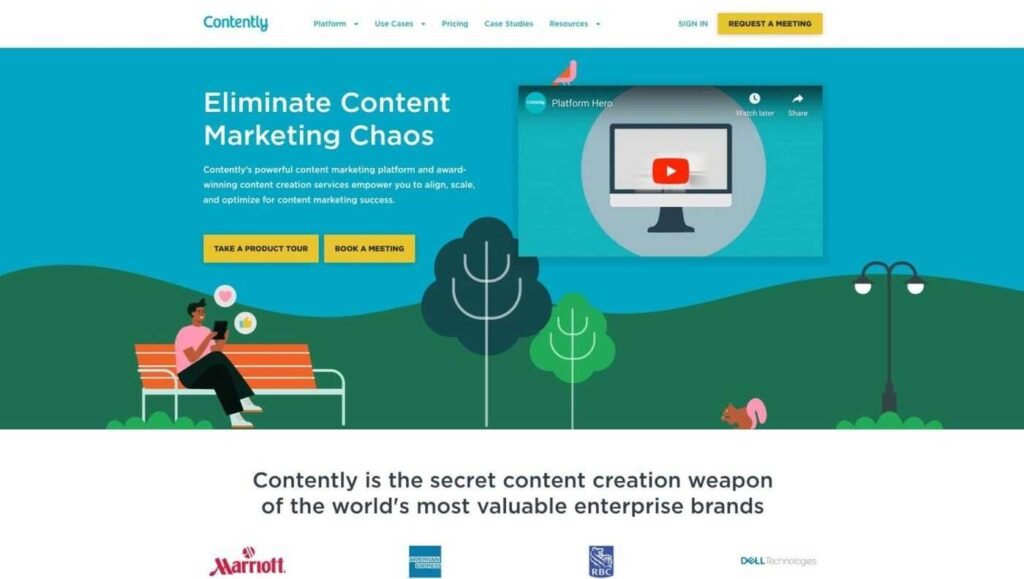
It’s not only user-friendly and powerful, but also great at fostering team collaboration. Its unique features include:
Content strategy tool: With this feature, you can define your content marketing goals, target markets, and topical themes, leading to a unified and results-driven content marketing plan.
Talent network: Finding the right people to outsource your content marketing activities can be challenging. This functionality helps you find the content marketing talent you need from a vast database of competent freelance designers, creatives, and writers.
Detailed analytics reporting: With Contently, you can analyze how your content is performing across your target distribution channels. So you can make strategic decisions based on hard data instead of relying on guesswork.
Contently is a content marketing software mainly designed for medium and large enterprises and content marketing teams with complex processes. So if you’re part of a small business, the platform is probably not suitable for you.
Percolate
Percolate has maintained its reputation as a comprehensive content marketing platform with tools that assist with planning, content creation, and content distribution.
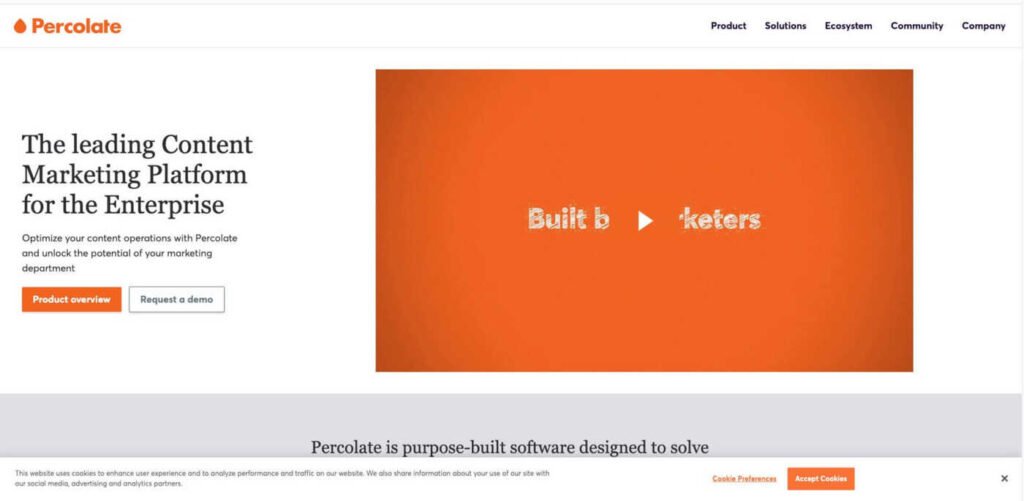
Focusing on streamlined workflows, efficient collaboration, and brand management, Percolate’s centralized hub lets users collaborate smoothly and maintain consistent branding across all channels and messages.
One of its standout features is Asset Manager. It’s a digital asset library that lets you store, organize, manage, and access your team’s visual assets. So you always have access to the correct assets when needed without wasting any time.
The Campaign Planner is another tool that makes Percolate worthwhile. From defining campaign milestones and allocating tasks to handling reviews and approvals, it offers a detailed framework to execute content marketing campaigns successfully.
Percolate is meant for medium and large enterprises with distributed workforces and complex content marketing operations.
ClearVoice
ClearVoice has all the essential features you’d expect from content marketing software. Plus, it’s a freelance marketplace where businesses can find writers and editors.

It lets you find journalists, bloggers, and influencers based on your budget. You can ask for ideas to be pitched to you, or just view the article pitches shared by freelancers.
The freelancers on the platform are vetted based on their qualifications and experience. This makes it easy for agencies and brands to find top talent.
Just like any other content marketing software, ClearVoice lets you store and organize your text, images, and videos in one place. So your team members can participate in collaborative editing and churn out great content.
You also get options to filter your campaigns and other data. This way, you can manage multiple content marketing projects without any confusion.
Thinkific
Being robust and user-friendly, Thinkific is another well-known software in the content marketing space. What separates it from other content marketing platforms is its sole focus on launching online courses.
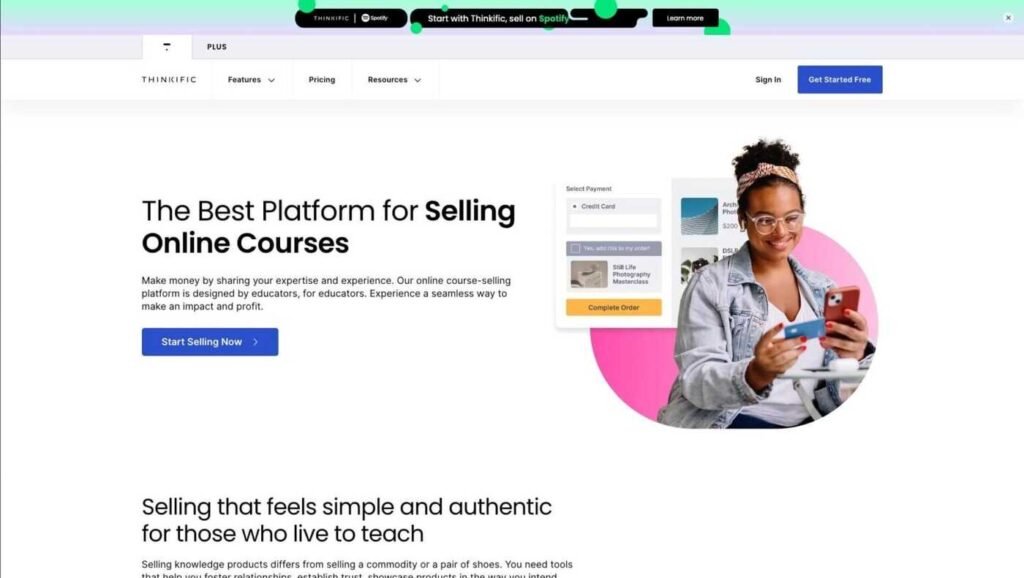
It lets people create and sell educational content in an engaging way. Key features include:
Flexible course creation: With Thinkific’s drag-and-drop course builder, you can design and edit your course curriculum with ease. And you can make sure that it aligns with your brand and training objectives.
Multiple modes of payment: It supports integration with major payment gateways. Course creators can get paid easily directly from their website via different means such as PayPal and credit cards.
Promotion tools: Thinkific has a good set of marketing tools to promote your courses. These include discount coupons, email marketing, and comprehensive analytics reports.
If you’re looking to build or enhance your brand as a thought leader with online education, Thinkific is a content marketing platform worth checking out. With this all-in-one solution, you can launch and manage all aspects of your online training.
Ceros
Ceros is an experiential content marketing platform. That means it’s more about layout and design than plain text. If you want to design immersive and interactive content without learning to code, then Ceros is for you.

With Ceros, you get a web-based canvas. And you can design visually appealing content by dragging and dropping elements, along with using other design-related tools provided in the platform.
There are several interactive and animation effects you can use to create beautiful digital content. You can also preview it while designing to see what the final result will look like.
Besides creating experiential content, Ceros helps you share your work. You can integrate the content into your blog or website as an embedded asset or standalone page. You can also distribute the content on Facebook and other channels.
Other than that, Ceros comes with analytics features that help you understand how your audiences are engaging with your content.
CoSchedule
CoSchedule needs no introduction. It has established itself as a top content marketing software, helping brands create, plan, and collaborate on content.
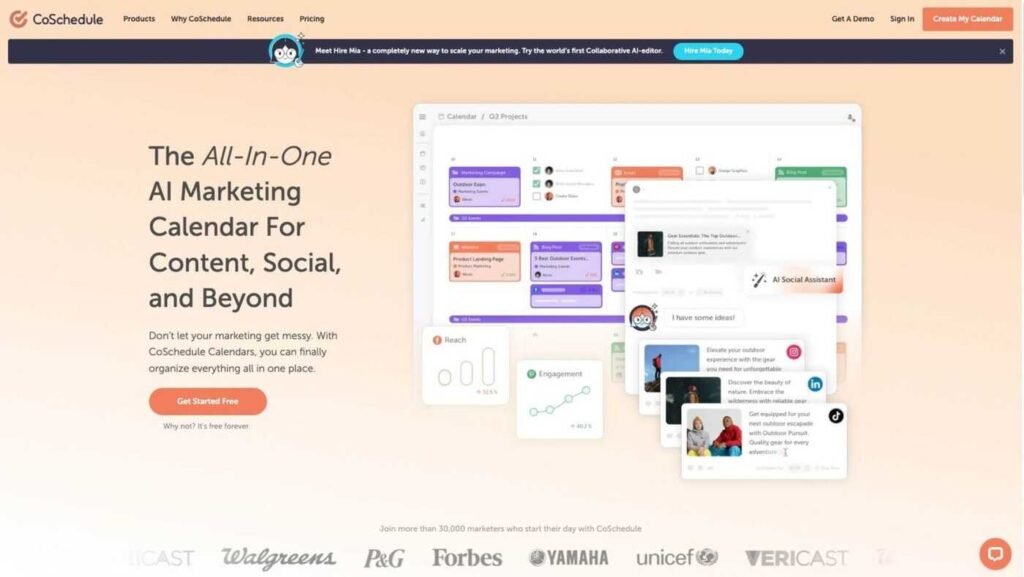
Known for its rich feature set and intuitive interface, CoSchedule is a complete solution to streamline content marketng workflows, improve teamwork, and drive powerful results.
The best part about CoSchedule is its powerful editorial calendar. Using this feature, brands can easily visualize and organize their content marketing efforts.
It’s a unified hub for handling content schedules, monitoring performance, assigning tasks, enhancing collaboration, and keeping the team on track.
Another unique feature is the Social Campaigns tool. It lets you execute social media campaigns straight from CoSchedule’s interface.
You also get comprehensive performance reporting capabilities to get insights from engagement and conversion metrics across various channels.
Semrush
Semrush is a versatile tool that can simplify your content creation process and improve your strategy. It helps you find the topics your audience cares about and identifies the right keywords to use, which can boost your search engine rankings.
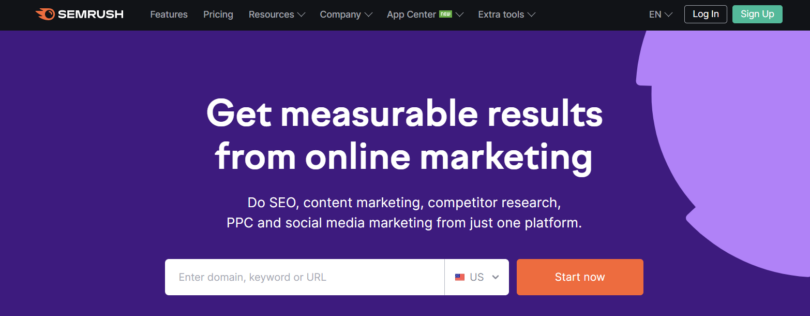
One of the handy features of Semrush is its ability to show you what your competitors are doing.
You can see which of their strategies are successful and find opportunities to stand out with your content. This way, you’re not just guessing but making informed decisions.
Semrush also provides tools for optimizing your content for SEO, which means your articles, blogs, or web pages have a better chance of being seen by more people. You can monitor how your content performs and make adjustments as needed, ensuring your efforts are paying off.
Overall, Semrush is a useful tool for anyone looking to enhance their content marketing. It offers practical insights and helps streamline your workflow, making it easier to reach and engage your audience.
DivvyHQ
DivvyHQ is a content planning and collaboration tool designed to make managing content projects smoother. If you’re juggling multiple content pieces and deadlines, DivvyHQ can help keep things organized.
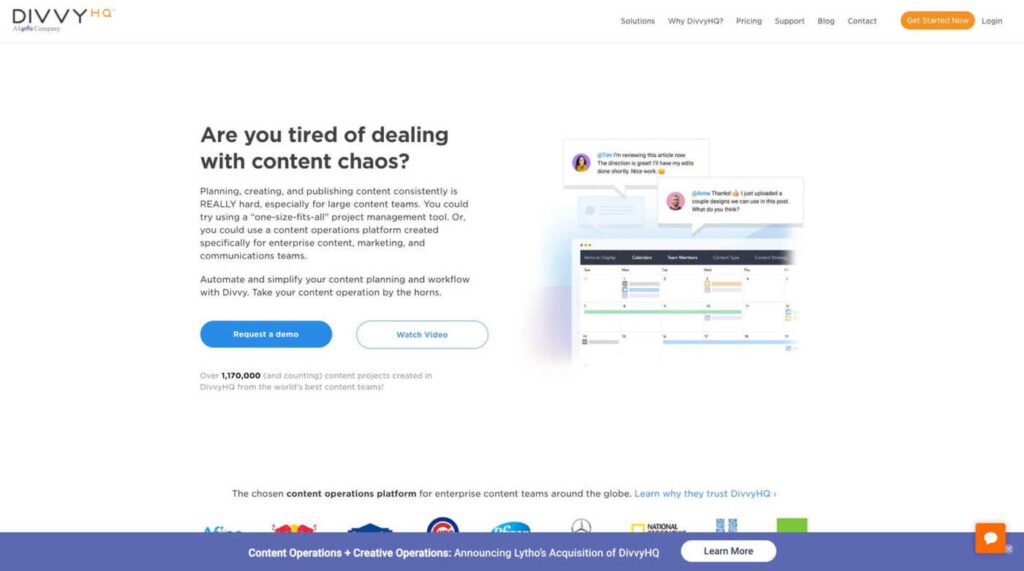
One of the main features is its content calendar. It’s straightforward and visual, letting you see all your projects at a glance. You can schedule posts, set deadlines, and track progress easily. This way, you always know what’s coming up next.
Collaboration is another strong suit of DivvyHQ. It allows team members to share ideas, leave comments, and assign tasks within the platform. This is highly useful if your team is working remotely or across different locations. Everyone stays on the same page, and communication is streamlined.
DivvyHQ also has a content repository. It’s like a central hub where you can store all your drafts, images, and other media. This makes it easier to keep everything in one place and access materials when you need them.
Lastly, the tool offers analytics to help you track how your content is performing. You can see what’s working and what might need some adjustments.
Overall, DivvyHQ is a practical tool for managing content projects, helping keep everything organized and your team working together smoothly.
BuzzSumo
BuzzSumo is a handy tool for anyone involved in content creation and marketing. It helps you find popular content and understand what resonates with audiences.
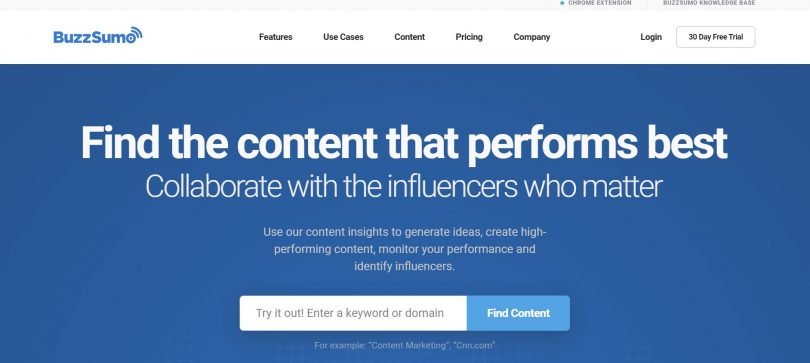
One of the key features is content discovery. You can search for topics and see which articles, videos, or posts are performing well. This gives you ideas for your own content and helps you understand trends.
BuzzSumo also lets you analyze your competitors. You can see what’s working for them and where there might be gaps you can fill. This can give you a strategic edge in your content planning.
Another useful feature is influencer identification. BuzzSumo helps you find key influencers in your industry. This can be great for outreach and building relationships that can amplify your content.
Finally, the tool provides content performance analytics. You can check how your content is doing in terms of shares, likes, and other engagement metrics. This helps you understand what’s working and where you might need to tweak your approach.
In short, BuzzSumo is a practical tool for discovering, planning, and analyzing content, making it easier to create material that engages your audience.
HubSpot
HubSpot is an all-in-one platform that helps manage various aspects of your marketing efforts seamlessly.
One of the standout features is its content management system (CMS). It lets you create and optimize blog posts, landing pages, and other content without needing technical skills.
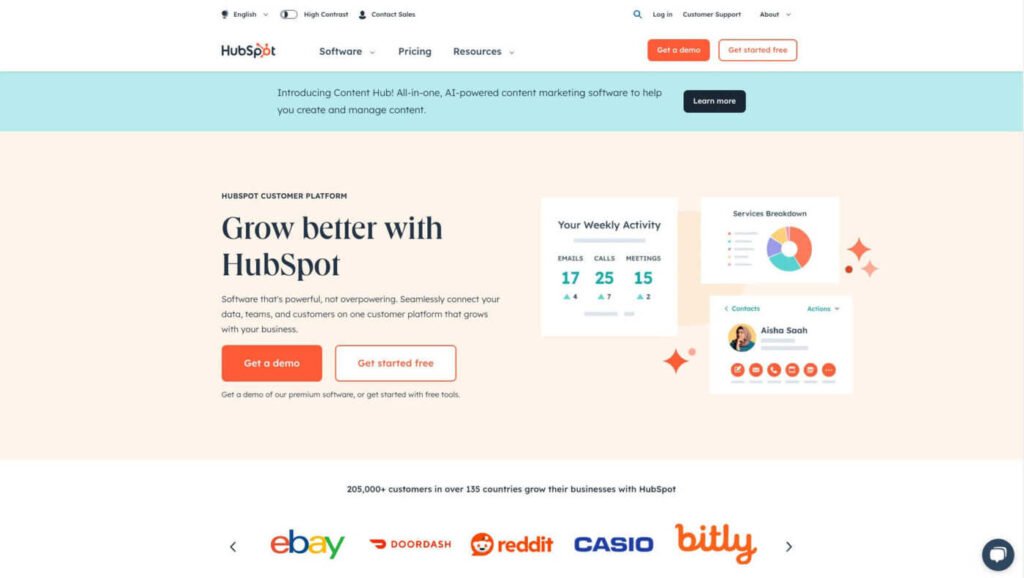
The CMS also includes SEO recommendations to help your content rank better in search engines.
HubSpot also has a robust marketing automation tool. This means you can set up automated email campaigns, social media posts, and workflows that save time and ensure consistency. You can nurture leads with personalized content, keeping them engaged throughout their journey.
Another handy feature is the analytics dashboard. It provides insights into how your content is performing, helping you track metrics like page views, conversion rates, and social media engagement. This data is crucial for understanding what works and refining your strategy.
Additionally, HubSpot’s CRM integration means you can align your content efforts with your sales team, ensuring everyone has the same view of customer interactions and needs.
In essence, HubSpot offers a suite of tools that simplify content creation, distribution, and analysis, making your marketing efforts more effective and coordinated.
Final thoughts on content marketing platforms
So, there you have it—a look at some of the top content marketing platforms out there.
Tools like Semrush, DivvyHQ, BuzzSumo, and HubSpot each bring something unique to the table, whether it’s simplifying content creation, helping you discover trending topics, or automating your marketing efforts.
Choosing the right content marketing software depends on what your specific needs are. If you’re looking for SEO insights, Semrush could be your go-to.
For project management and team collaboration, DivvyHQ offers a streamlined approach.
BuzzSumo is great for understanding what content is resonating across the web, and HubSpot provides a comprehensive suite of tools for managing all aspects of your content marketing.
Each of these platforms can help make your content marketing more organized and effective, allowing you to focus on creating valuable content that connects with your audience. It’s all about finding the right fit for your workflow and goals.
Did I miss anything? Did you try these platforms? Do you have any questions or comments? Share your thoughts below in the comments section.




Thanks for this great overview of content marketing platforms in 2025! I especially appreciated how you broke down what features to look for — things like collaboration tools, analytics, and scalability often make or break the experience. It’s helpful to see how different platforms serve different needs (SEO, content scheduling, design, etc.). This will be really useful for anyone trying to choose the right platform based on their goals and team setup.